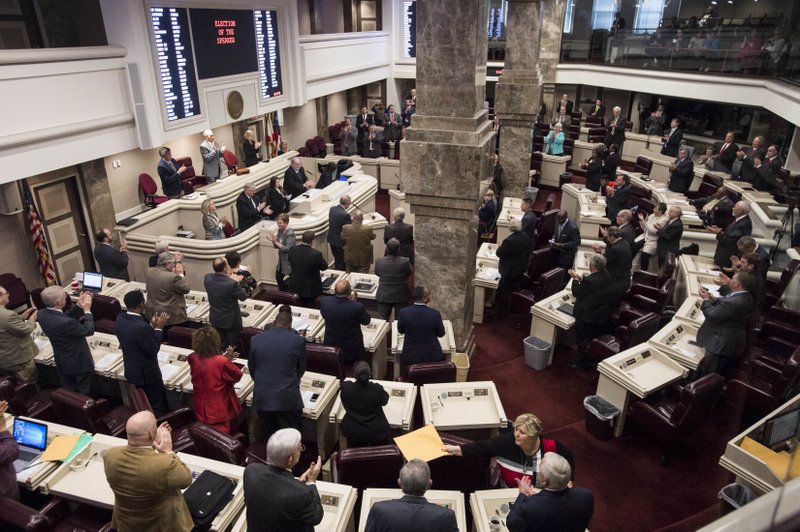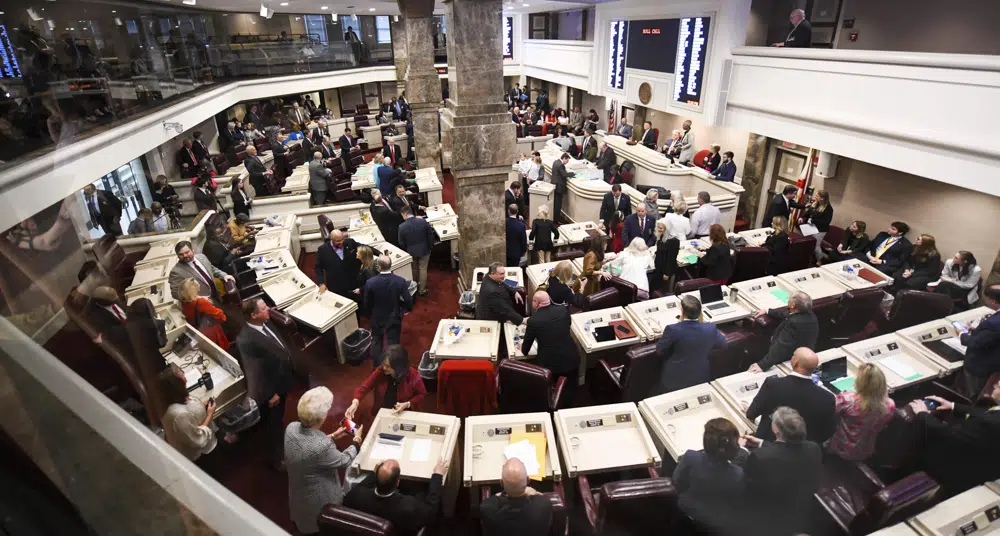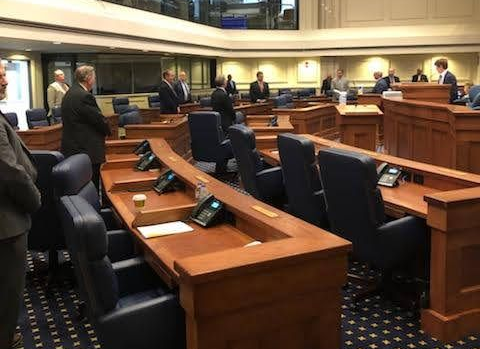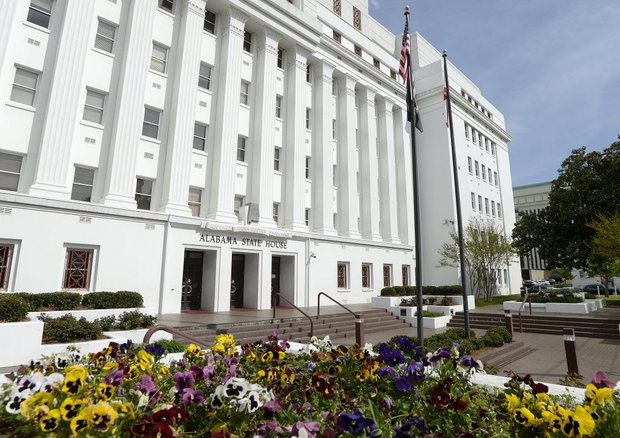Wes Allen addresses the Republican Women of Trussville

Alabama Secretary of State Wes Allen spoke on Thursday to the Republican Women of Trussville (RWOT) at the Trussville Civic Center. Allen said that he was sworn in as Alabama’s Secretary of State in January and that both of his two children are now in college. “It has been a big year,” Allen said. “We have got both kids out of the house. It is an adjustment when the kids move out.” “I was born and raised in Tuscaloosa County at the end of a dirt road,” Allen said. From 2018 to 2022, Allen represented Pike County in the Alabama House of Representatives. The group applauded him for sponsoring legislation forbidding doctors from performing gender-altering procedures and treatments on children. “I introduced the House legislation, but the man in the back of the room, (State Senator) Shay Shelnutt, was the man in the Senate,” Allen said. “It took us three years to get it passed.” Shelnutt said, “It should not have taken that long.” “Those procedures, no matter what they tell you, is not reversible,” Allen continued. “It is tied up in federal court,” Allen said. “We will see how that progresses.” RWOT President Terri LaPoint praised the group for their door-knocking to help elect Mike Bolin to the Jefferson County Commission in a recent special election, thus maintaining a 3 to 2 Republican control of the Commission. “Mile Bolin’s win – that was a huge race,” Allen said. “Door knocking makes a big difference. “The best thing we can do is elect conservative people at the local level,” Allen said. “Mike Bolin – it is important to elect conservatives at the county commission level, at the city council level, at the school board level. We have seen how important it is to have conservatives on the library board. Prior to his service in the legislature, Allen was the Probate Judge of Pike County. Allen said his experience as a probate judge helped prepare him to be Secretary of State. “They are our customers,” Allen said of persons coming to their office. “We may not have the government service they want, but they are looking for help. It is our duty as public officials to help them with their problem.” Sometimes the people who came to the Pike County Probate Judge’s office were not in the right office. “Whether or not we could help their problem, we wanted to get them to the right place,” Allen explained. “I take that philosophy with me to the Secretary of State’s office.” “The Secretary of State’s office has 40 employees,” Allen explained. “35 are merit-based. They are here from administration to administration. We have some that are political appointees – the executive staff: Chief of staff, legal counsel, deputy legal counsel, director of legislative affairs, that sort of things.” “We have had a lot of speaking requests,” Allen said. His focus has been on doing the job and “getting things done” in his first six months on the job. “We are now moving around a little more. It is a pleasure to be here.” Allen said that his office recently became aware of a scam using the name of the Alabama Secretary of State’s office. “We are working closely with the Securities Exchange Commission to make sure they don’t get any kind of money, no matter how small,” Allen said. Allen said that he does not court attention and just does his job. “I shouldn’t be running over people to get in front of a camera,” Allen said. Allen said it is important for him to get out into communities and explained that he schedules two or three meetings in towns that he visits to get the pulse of that community. “We want to make sure that we are not so connected in Montgomery that we forget what is happening in Trussville or what is happening in Moulton,” Allen said. “We are fighting fraud in the election side as well,” Allen said. “As a former probate judge, I know what it is like to be at the courthouse at 5:30 on election day, and I know what it is to be the last person to walk out of the courthouse and lock the doors.” “There will be a lot of eyeballs on these secretary of states offices next year,” Allen said. “We are already making preparation for 2024.” “We had illegal immigrants who were stealing IDs in North Alabama,” Allen said. “They were even voting in local elections.” “We removed a board of registrar for registering people who did not live at the location where she registered them,” Allen said. “We removed her. We are not a prosecuting agency, so we turned it over to the local DA in Houston County.” “It all starts in the Board of Registrars offices,” Allen said. “They do a wonderful job, but we had this one person we needed to remove.” “The more I learned about ERIC and studied it, it was really a data mining operation,” Allen said of his controversial decision to withdraw from the ERIC system for managing the voter rolls. “It has been like eight states that have followed our lead,” Allen said. “I cannot talk about the Alabama whole plan that we are putting out yet, but I think you will be proud of what we come up with.” Allen said that in his legislative agenda, “We wanted to solidify our election process.” “It doesn’t take Alabama weeks to count ballots like you have seen across the country,” Allen said. “With the help of Shay Shelnutt, we are always going to have a paper ballot to vote on even after I am gone. Matt Simpson carried it in the house.” “You will always vote on paper ballots in Alabama,” Allen said. “A great piece of legislation. It is common sense.” Allen said that Sen. Clyde Chamblis and Simpson carried his legislation “to make sure that our tabulators cannot be connected to the internet.” The legislature also passed his legislation for a poll worker pay increase. That bill was carried by Rep. James Lomax and Sen. Sam Givhan. “We have partnered with the Alabama State Bar so that
AG Steve Marshall applauds bill that corrects fatal flaw in parole statute

On Thursday, Alabama Governor Kay Ivey signed legislation to prevent criminals facing serious pending charges from getting out on parole. House Bill 131 (HB131) was sponsored by State Representative Wes Kitchens (R-Guntersville) and carried in the Senate by State Sen. Sam Givhan (R-Huntsville). Alabama Attorney General Steve Marshall applauded the signing of HB131 to correct a fatal flaw in Alabama’s parole system. HB131 was proposed after the infamous Jimmy O’Neal Spencer case exposed a statutory loophole that allowed a prisoner with pending charges to still be considered for parole before those charges were properly resolved. “Throughout the session, this legislature has prioritized the correction of deficiencies within our criminal justice system,” said Attorney General Marshall. “HB131 closes an important loophole to ensure that no offender be released on parole while new charges are pending. This is a public safety issue, but it also spares crime victims of having to show up and relive their experiences at parole hearings that are unnecessary.” In August 2022, Jimmy O’Neal Spencer – who was serving two life sentences and was awaiting trial on three capital-murder charges – was given a parole hearing. The parole board at the time denied Spencer’s parole, but Marshall said that this peculiar loophole in our parole system needed to be closed. According to the synopsis, “Under existing law, prisoners in the custody of the Department of Corrections are eligible for parole in certain circumstances. This bill would provide that a prisoner is not eligible for parole if he or she has been duly charged with a new offense that has not been disposed.” “If you are a prisoner facing serious charges that carry penalties by more than six months, you can’t be up for parole,” Kitchens said. Spencer, a lifetime career criminal, came up for parole even though he was then facing three charges of capital murder for the slayings of Colton Lee, Martha Reliford, and Marie Martin. Crimes he committed after the previous Parole Board granted him parole even though he was serving two life sentences. An angry Gov. Ivey replaced the Board members in the wake of this and other debacles for their leniency that was widely condemned as far too reckless. The new Parole Board denied Spencer’s parole application, but that could have ended differently with much more lenient parole commissioners. The signing of this legislation has closed that loophole in existing statute. 2023 has been a good legislative session for Marshall. He said that as the Chief Law Enforcement Officer of Alabama, he has led on three public safety initiatives this legislative session, including the Deputy Brad Johnson Act and SB143, creating sentencing enhancements for members of criminal enterprises, including gangs. Each bill has been met with overwhelming bipartisan support. The legislature has also imposed stiffer penalties on exhibition driving, organized retail theft, and deadly fentanyl traffickers. The state is in the process of building two new mega prisons in Elmore and Escambia Counties. Marshall is serving his second elected term as attorney general following his landslide re-election last year. Tuesday is the final day of the 2023 Alabama Regular Legislative Session. To connect with the author of this story or to comment, email brandonmreporter@gmail.com.
Alabama Legislature passes anti ESG legislation

On Thursday, the Alabama Senate passed legislation that would require companies that want state of Alabama contracts to forgo any sort of ESG (environmental, social, and governance) woke corporations or ESGs. Senate Bill 261 (SB261) is sponsored by State Senator Dan Roberts (R-Mountain Brook). It is carried in the House by Rep. Chip Brown (R-Hollinger’s Island). The anti-ESG legislation would prohibit state and local governments from entering into certain contracts that boycott businesses in certain sectors or based on certain environmental or corporate governance criteria. SB261 has been billed as the strongest anti-ESG legislation in the nation. Though the legislature is split along partisan lines on this legislation, both sides elected not to debate the issue in the House of Representatives. Instead, they advanced the bill directly to a vote when it came up on Wednesday’s special-order calendar. The bill prohibits governmental entities from entering into certain contracts with companies that boycott businesses because the business engages in certain sectors or does not meet certain environmental or corporate governance standards, or does not facilitate certain activities. The legislation authorizes the Attorney General to take action to investigate and enforce this act. “I appreciate the support of my colleagues in the Senate for working to pass this legislation,” Sen. Roberts told reporters. “The Alabama Senate has made it clear that we want businesses to focus on growing and expanding and not working to push any political agenda with left-wing ESG policies.” If a company engages in social activism banned by the legislation, then it can’t do business with any local or state government. According to the bill, “This bill would prohibit a governmental entity from entering into a public contract for goods or services with certain companies or businesses that engage in the economic boycott of businesses in certain sectors and industries; that fail to meet or commit to meet certain environmental standards; that fail to meet or commit to meet certain corporate governance criteria; or that fail to facilitate certain activities.” Companies would have to sign a verification that it does not engage in boycotts of other companies and industries. Governments can opt out of this provision if they can prove that it would have an adverse economic effect on that government if they can’t do business with that company. The bill states, “The Attorney General shall seek to prohibit the adoption of federal laws, rules, regulations, bulletins, executive orders, or other federal actions that may penalize, inflict economic harm on, limit commercial relations with, or change or limit the activities of a company in the state or a resident of the state based on the furtherance of economic boycott criteria or other similarly oriented rating.” It also protects companies from state or local governments trying to pressure them company into adopting woke political action. “No company in this state shall be penalized, have economic harm inflicted on it, have commercial relations limited, or have the activities of the company changed or limited by a governmental entity because the company will not engage in economic boycotts; will not establish or implement policies, procedures, guidelines, rules, reports, products, services, notices, disclosures, or rates or pricing; will not provide or submit answers to surveys or other information requests or disclosures; will not invest in or divest of certain securities, stocks, bonds, bills, partnerships, or other investment arrangements; or will not initiate other corporate or business practices that further social, political, or ideological interests including, but not limited to, economic boycott criteria or other similarly oriented rating.” “We have industry in or state that can be hurt by things going on nationally,” Roberts explained on the Senate floor. “We are trying to put them in position so they can thrive. We are trying to make sure that they have access to the mother’s milk of capital in the future.” Sen. Bobby Singleton (D-Greensboro) brought an amendment to the committee substitute of the bill. “It was given to me by the governor’s office,” Singleton said. “The finance department, they just wanted to make sure that they are protected in dealing with the state’s debt obligations.” Roberts accepted the Singleton amendment as friendly. “I think this is an anti-business bill,” Singleton said. “You are telling people that do business in the state of Alabama that you can’t have a social conscience.” “This is not a pro-business bill,” Singleton said. “Dan, you are wrong on this one. I will tell you, Dan, that you are wrong on this one.” “You can’t listen to Fox and decide what you are going to do,” Singleton continued. “We can’t be Florida 20. We won’t be able to recruit with this on the ground. This is a threat to business. If I don’t sign this paragraph, I can’t do business in Alabama.” Senate President Pro Tempore Greg Reed (R-Jasper) said, “This is a difficult topic. This is one that is at a national level that we have to deal with.” Sen. Sam Givhan (R-Huntsville) said, “We did have great dialogue. We had businesses across the gamut in the state of Alabama. We sat down in a room with them, and they presented us with their redlines.” Sen Robert Stewart (D-Selma) said, “Corporations do have an obligation to be good actors.” Givhan responded, “Their job is to maximize shareholder wealth.” Givhan explained the Singleton amendment, which exempts the State Finance Department from following this when refinancing debt obligations. “Debt obligations – that is targeted at the bond market,” Givhan said. “There is not a lot of businesses in that space. We wanted to make sure that we weren’t shooting ourselves in the head. Some think we may have opened the barn door too much.” SB261 passed the Alabama House of Representatives 74 to 27. It had previously passed the Senate by a vote of 27 to 8. The legislation now goes to the Governor for her consideration. Wednesday was day 28 of the 2023 Alabama Regular Legislative Session. To connect with the author of this story or to comment, email brandonmreporter@gmail.com.
Alabama House to consider ambitious special-order calendar on Wednesday

The Alabama House of Representatives will meet on Wednesday at 1:00 p.m. to consider a very ambitious proposed special-order calendar. Senate Bill 206 (SB206) is sponsored by State Senator Clyde Chambliss (R-Prattville). It is being carried on the floor by State Representative Allen Treadaway (R-Morris). SB206 creates the crime of organized retail theft and turns what used to be misdemeanor shoplifting into a felony. Senate Bill 261 (SB261) is sponsored by Sen. Dan Roberts (R-Mountain Brook). It is carried in the House by Rep. Chip Brown (R-Hollinger’s Island). The anti-ESG legislation would prohibit state and local governments from entering into certain contracts that boycott businesses in certain sectors or based on certain environmental or corporate governance criteria. Senate Bill 279 (SB279) is sponsored by Sen. Randy Price (R-Opelika) and carried in the House by Rep. Matt Woods (R-Jasper). SB279 deals with elected county superintendents of education. Under existing law, the salary for an elected county superintendent of education is required to be set by the county board of education before the beginning of the term of office. This bill would remove that requirement retroactive to July 1, 2021. Senate Bill 94 (SB94) is sponsored by Sen. April Weaver (R-Briarfield) and is carried in the House by Rep. Corley Ellis (R-Columbiana). SB94 would move the Shelby County juvenile probation services and probation officers into the state court system. Senate Bill 99 (SB99) is sponsored by Sen. Sam Givhan (R-Huntsville) and carried in the House by Rep. Prince Chestnut (D-Selma). SB99 would increase the mileage reimbursement rate received by jurors Senate Bill 56 (SB56) is sponsored by Sen. Arthur Orr (R-Decatur) and carried in the House by Rep. Allen Baker (R-Brewton). SB56 would require the use of video cameras in certain special education classrooms. Allen is bringing a substitute version of the bill. Senate Bill 292 (SB292) is sponsored by Sen. Roberts and carried by Rep. Joe Lovvorn (R-Auburn). SB292 would provide for the Department of Revenue to grant certificates of exemption from sales and use taxes to contractors and subcontractors licensed by the State Licensing Board for General Contractors for the purchase of building materials and construction materials to be used in the construction of a project for an entity that is exempt by law from paying sales and use taxes. Senate Bill 223 (SB223) is sponsored by Sen. Vivian Figures (D-Mobile) and carried in the House by Rep. Matt Simpson (R-Daphne) would include a child witness in the definition of “a physical offense, sexual offense, or violent offense” for the purpose of the Child Physical and Sexual Abuse Victim Protection Act. Senate Bill 309 (SB309) is sponsored by Sen. Chambliss and carried by Rep. Wood in the House. SB309 is related to contracts for professional services to provide for the procurement of certain professional service contracts based on competitive, qualification-based policies and procedures, as well as to provide for the advertisement of such contracts; and to subject such contracts to a fee schedule established by the Division of Construction Management of the Department of Finance. Senate Bill 198 (SB198) is sponsored by Sen. Orr and carried in the House by Rep. Cynthia Almond (R-Tuscaloosa). It would add additional offenses that would be subject to the presumptive sentencing guidelines; to modify the criminal penalties for criminal solicitation, attempt, and criminal conspiracy; to give a judge discretion when sentencing a person convicted of a Class C or Class D felony offense. Senate Bill 184 (SB184) is sponsored by Sen. Greg Albritton (R-Atmore) and carried in the House by Rep. Kyle South (R-Fayette). SB184 would authorize the Department of Corrections to expend funds for the recruitment and training of law enforcement officers and to further the mission of the department. South will introduce a substitute version of the bill. Senate Bill 224 (SB224) is sponsored by Sen. Figures and carried in the House by Rep. Simpson. It provides for the age of a child for the crime of transmitting obscene material to a child by computer, to establish jurisdiction for a violation of distributing a private image, and further provides for the crime of incest. Senate Bill 281 (SB281) is sponsored by Sen. Albritton and carried by Rep. Margie Wilcox (R-Mobile). SB281 creates a new distinctive license plate to benefit the USS Alabama Battleship Commission. Senate Bill 285 (SB285) is sponsored by Sen. Jones and carried in the House by Rep. Terri Collins (R-Decatur).SB285 will allow nonprofit organizations to host wine festivals. Senate Bill 176 (SB176) is sponsored by Sen Orr and carried by Rep. Collins. SB176 is the Student Right to Know Act of 2023. It requires the Alabama Commission on Higher Education to collect and make available online data for students to plan for their educational and professional futures; and for the Workforce Division of the Department of Commerce to share data and information with ACHE. Senate Bill 192 (SB192) is sponsored by Sen. Albritton and is carried in the House by Rep. Donna Givens (R-Loxley). SB192 would allow private corporations to limit access to industrial facilities and that industrial access roads to continue to be maintained as a public corporation. Senate Bill 263 (SB263) is sponsored by Sen. Donnie Chesteen (R-Dothan) and carried in the House by Rep. Terri Collins (R-Decatur). SB263 makes changes to the Alabama Accountability Act of 2013. It revises the law to change the term failing school to priority school and nonfailing to qualifying school to make other changes. Senate Bill 258 (SB258) is sponsored by Sen. Andrew Jones (R-Centre). It deals with nonprofit corporations that provide water services to the public authorizing a one-time audit by the Department of Examiners of Public Accounts. There is a substitute version of this bill. Senate Bill 103 (SB103) is sponsored by Sen. Orr: and carried by Rep. Almond. It would require the Alabama Ethics Commission to provide exonerating evidence to persons accused of ethics wrongdoing. Almond will introduce a substitute. Senate Bill 76 (SB76) is sponsored by Sen. Will Barfoot (R-Pike Road). It is carried in the House by Rep. Lovvorn. SB76 establishes the Rural Logging Support Act, funding supporting rural economic Development. Wednesday will be Day 28 of the 2023 Alabama Regular Legislative Session. To connect with the author of this story or to comment, email brandonmreporter@gmail.com.
Alabama House passes legislation to hire more judges

On Tuesday, the Alabama House of Representatives passed legislation adding new judges to reduce the dockets in Alabama’s fastest-growing judicial circuits. As the state’s population has grown, the number of judgeships has not kept pace, particularly in those counties that have experienced the most rapid growth. Senate Bill 39 (SB39) is sponsored by State Senator Sam Givhan (R-Huntsville). SB39 will add four additional circuit judgeships in the 23rd Circuit (Madison County), the 28th (Baldwin County), the 19th (Autauga, Chilton, and Elmore counties), and the 37th (Lee County), as well as three additional district judgeships in Baldwin, Mobile, and DeKalb counties. Addressing the overcrowded dockets in Alabama’s fastest-growing jurisdictions has been a priority of the Alabama Judges Association and Chief Justice Tom Parker. House Ways and Committee General Fund Chair Rex Reynolds (R-Huntsville) said when the first version of the budget passed the House that he was committed to working with the judges to fix this problem. Speaker of the House Nathaniel Ledbetter (R-Rainsville) previously told Alabama Today that he and the House were in favor of legislation addressing the state’s judge shortage. Ledbetter said that his own county had a judge shortage of 2.7 judges. The bipartisan legislation received a favorable report from the House Judiciary Committee on Wednesday. SB39 would also put a moratorium on the reallocation of judges until 2027. Reallocating judgeships from stagnant parts of the state like Birmingham, Montgomery, and the Black Belt to growing, prosperous areas like Baldwin, Madison, Shelby, Lee, and Elmore counties is very controversial for the areas that would lose those judgeships. The Legislature established a reallocation commission in 2015, but the courts have not reallocated judgeships as the Legislature had intended. The new judgeships would be filled by elections in 2024, with the new judges going into office in the second week of January 2025. According to the fiscal note, passage of SB39 will cost the state $2.1 million in 2025 and at least $2.9 million a year beyond that. The effect on the SGF will be $1.9 million in FY2025 and $2.5 million in FY2026 and beyond. The new circuit judge in the 19th circuit may reside in any county within the Nineteenth Judicial Circuit (Chilton, Autauga, or Elmore counties) and shall be assigned to the domestic relations division of the circuit. The bill passed the Alabama House of Representatives 102 to 0. The Legislature also tasks the Administrative Office of Courts to provide an annual report on the caseload statistics for each fiscal year by circuit. The legislation previously passed the Alabama Senate by a vote of 33 to 0. Supporters say that additional judges will help reduce the case backlogs in those circuits getting additional judges, which means that jury trials can occur in a more timely manner, justice will happen more quickly, business disputes can be resolved more quickly, and child custody issues can be dealt with on a more expedited basis. SB39 now goes to the Governor for her consideration. Wednesday will be day 25 of the 2023 Alabama Regular Legislative Session. To connect with the author of this story or to comment, email brandonmreporter@gmail.com.
House to address legislation hiring more judges on Tuesday

On Tuesday, the Alabama House of Representatives will consider legislation adding new judges to reduce the dockets in Alabama’s fastest-growing judicial circuits. Senate Bill 39 (SB39)is sponsored by State Senator Sam Givhan (R-Huntsville). SB39 is the first item on the House’s proposed special order calendar for Tuesday. The version of the legislation that passed the Senate would add four additional circuit judgeships in the 23rd Circuit (Madison County), the 28th (Baldwin County), the 19th (Autauga, Chilton, and Elmore counties), and the 37th (Lee) as well as three additional district judgeships in Baldwin, Mobile, and DeKalb counties. SB39 would also put a moratorium on the reallocation of judges until 2027. The reallocation of judgeships from stagnant parts of the state like Birmingham, Montgomery, and the Black Belt to growing, prosperous areas of the state like Baldwin, Madison, Shelby, Lee, and Elmore counties is very controversial for the areas that would lose those judgeships. The legislature established a reallocation commission in 2015, but the courts have not reallocated judgeships as the legislature had intended. The new judgeships would be filled by elections in 2024, with the new judges going into office in the second week of January 2025. According to the fiscal note, passage of SB39 will cost the state $2.1 million in 2025 and at least $2.9 million a year beyond that. The effect on the SGF will be $1.9 million in FY2025 and $2.5 million in FY2026 and beyond. The new circuit judge in the 19th circuit may reside in any county within the Nineteenth Judicial Circuit (Chilton, Autauga, or Elmore counties) and shall be assigned to the domestic relations division of the circuit. SB39 also orders the Administrative Office of Courts to provide an annual report on the caseload statistics for each fiscal year by circuit. The legislation passed the Alabama Senate in a vote of 33 to 0. Speaker of the House Nathaniel Ledbetter (R-Rainsville) previously told Alabama Today that he and the House favored legislation addressing the state’s judge shortage. Overcrowded dockets mean that jury trials are often delayed for months denying victims justice, leaving business disputes unsettled for years, tying up estates, delaying final determinations in child custody cases, and making it difficult to live and do business in the state of Alabama. Tuesday will be day 24 of the 2023 Alabama Regular Legislative Session. The House convenes at 1:00 p.m., and the Senate convenes at 3:00 p.m. To connect with the author of this story or to comment, email brandonmreporter@gmail.com.
Alabama Senate passes anti ESG legislation

On Thursday, the Alabama Senate passed legislation that would require companies that want state of Alabama contracts to forgo any ESG (environmental, social, and governance) woke corporations or ESGs. Senate Bill 261 (SB261) is sponsored by State Senator Dan Roberts. Senate Bill 261 has been billed as the “strongest” anti-ESG legislation in the nation. The bill prohibits governmental entities from entering into certain contracts with companies that boycott businesses because the business engages in certain sectors, does not meet certain environmental or corporate governance standards, or does not facilitate certain activities. The legislation authorizes the Attorney General to take action to investigate and enforce this act. “I appreciate the support of my colleagues in the Senate for working to pass this legislation,” Sen. Roberts told reporters. “The Alabama Senate has made it clear that we want businesses to focus on growing and expanding and not working to push any political agenda with left-wing ESG policies.” If a company engages in social activism banned by the legislation, it can’t do business with any local or state government. According to the bill, “This bill would prohibit a governmental entity from entering into a public contract for goods or services with certain companies or businesses that engage in the economic boycott of businesses in certain sectors and industries; that fail to meet or commit to meet certain environmental standards; that fail to meet or commit to meet certain corporate governance criteria; or that fail to facilitate certain activities.” Companies would have to sign a verification that it does not engage in boycotts of other companies and industries. Governments can opt out of this provision if they can prove that it would have an adverse economic effect on that government if they can’t do business with that company. The bill states, “The Attorney General shall seek to prohibit the adoption of federal laws, rules, regulations, bulletins, executive orders, or other federal actions that may penalize, inflict economic harm on, limit commercial relations with, or change or limit the activities of a company in the state or a resident of the state based on the furtherance of economic boycott criteria or other similarly oriented rating.” It also protects companies from state or local governments trying to pressure them company into adopting woke political action. “No company in this state shall be penalized, have economic harm inflicted on it, have commercial relations limited, or have the activities of the company changed or limited by a governmental entity because the company will not engage in economic boycotts; will not establish or implement policies, procedures, guidelines, rules, reports, products, services, notices, disclosures, or rates or pricing; will not provide or submit answers to surveys or other information requests or disclosures; will not invest in or divest of certain securities, stocks, bonds, bills, partnerships, or other investment arrangements; or will not initiate other corporate or business practices that further social, political, or ideological interests including, but not limited to, economic boycott criteria or other similarly oriented rating.” Sen. Rodger Smitherman said that the bill was unconstitutional. “I am trying to save you from yourselves,” Smitherman said. “You either don’t know the Constitution or don’t understand the Constitution.” “If you say that they don’t have free expression, you are going to lose,” Smitherman said. “I have been a constitutional law professor for 25 years. Doing something that is unconstitutional just because it feels good does not make sense.” “We have industry in our state that can be hurt by things going on nationally,” Roberts explained. “We are trying to put them in position so they can thrive. We are trying to make sure that they have access to the mother’s milk of capital in the future.” Sen. Bobby Singleton brought an amendment to the committee substitute of the bill. “It was given to me by the governor’s office,” Singleton said. “The finance department; they just wanted to make sure that they are protected in dealing with the state’s debt obligations.” Roberts accepted the Singleton amendment as friendly. “I think this is an anti-business bill,” Singleton said. “You are telling people that do business in the state of Alabama that you can’t have a social conscience.” “This is not a pro-business bill,” Singleton said. “Dan, you are wrong on this one. I will tell you, Dan, that you are wrong on this one.” “You can’t listen to Fox and decide what you are going to do,” Singleton continued. “We can’t be Florida 2.0. We won’t be able to recruit with this on the ground. This is a threat to business. If I don’t sign this paragraph, I can’t do business in Alabama.” Senate President Pro Tempore Greg Reed said, “This is a difficult topic. This is one that is at a national level that we have to deal with.” Roberts left after he learned that his friend, Pastor Harry Reeder, had died driving home from a meeting with Roberts and legislators. Sen. Sam Givhan then assumed the role of advocating for the bill. “We did have great dialogue,” Givhan said of talks with the Alabama business community on the bill. “We had businesses across the gamut in the state of Alabama. We sat down in a room with them, and they presented us with their redlines.” “They are never going to tell you no because they feel vulnerable,” Singleton said. “They know you can pass it anyway.” “They probably walk out of the room and cuss you out once they are out of the room,” Singleton said. “I am sure if they had their way, it would just go away.” Sen Robert Stewart said, “Corporations do have an obligation to be good actors.” Givhan responded, “Their job is to maximize shareholder wealth.” “Why are we trying to tell businesses what they can and can’t do even businesses we do not give incentives,” Smitherman said, “How do we make these God-like decisions? Just because we have authority does not mean that we are God.” Givhan explained the Singleton amendment. “Debt obligations – that is targeted at the bond market,” Givhan said. “There is not
Senate passes legislation to create new judgeships

On Thursday, the Alabama Senate passed legislation creating four additional circuit judgeships and three additional district judges. Senate Bill 39 (SB39) is sponsored by Sen. Sam Givhan (R-Huntsville). The legislation creates four new circuit judgeships in the 23rd Circuit (Madison County), the 28th (Baldwin County), the 19th (Autauga, Chilton, and Elmore counties), and the 37th (Lee) as well as three additional district judgeships in Baldwin, Mobile, and DeKalb counties. Alabama has grown over the years in population, but the number of circuit and district judges in Alabama has not increased at the same pace. This means higher case dockets for most of the judges the state has, which translates into divorces, civil litigation, and even criminal trials being postponed as overworked courts cannot expedite trials, hearings, and other work. Chief Justice Tom Parker told a reporter two years ago that the state needed 21 more judges. The Legislature addressed this in 2015 when they passed a plan to reallocate judgeships. The plan was to reallocate judgeships to growing areas of the state, like Shelby County, Madison County, and Baldwin County, from declining or stagnant areas of the state, like Montgomery County, Jefferson County, and the Black Belt. When a judgeship was vacated due to death, retirement, or removal from the bench the Reallocation Commission was to have ordered that vacant judgeship reallocated from where the need was lesser to where it was greater. That was not popular with the judges and has not happened with great regularity. At the assistance of Senator Rodger Smitherman (D-Birmingham) and the Alabama Judges Association, SB39 would put a moratorium on the reallocation of judges until 2027. The new judgeships would be filled by elections in 2024, with the new judges going into office in the second week of January 2025. This means that the fiscal year 2024 state general fund budget (SGF) that passed the House three weeks ago, which included no additional money for judges, will not need to be amended heavily if SB39 becomes law. According to the fiscal note, passage of SB39 will cost the state $2.1 million in 2025 and at least $2.9 million a year beyond that. The effect on the SGF will be $1.9 million in FY2025 and $2.5 million in FY2026 and beyond. An earlier version of the bill created a new circuit judge in the eleventh circuit (Lauderdale County) instead of the thirty-seventh (Lee County). The substitute version that passed the Senate on Thursday eliminates that new circuit judgeship and moves that circuit judgeship to the thirty-seventh – though that change does not appear in the fiscal note. The new circuit in the 19th circuit may reside in any county within the Nineteenth Judicial Circuit (Chilton, Autauga, or Elmore counties). The judge occupying Judgeship Number 4 shall be assigned to the domestic relations division of the circuit. The initial judges elected to the additional judgeships created by SB39 shall serve for a six-year term, holding office from the first Monday following the second Tuesday in January after the general election at which the judges are elected. SB29 also orders the Administrative Office of Courts to provide the following statistics for each fiscal year by circuit: (1) Number of civil cases filed broken down by category. (2) Number of civil cases resolved via a motion to dismiss or voluntary dismissal. (3) Number of civil cases resolved via a motion for summary judgment. (4) Number of civil cases in which a jury is empaneled. (5) Number of civil cases tried to a jury verdict. (6) Number of criminal cases filed broken down by type of offense. (7) Number of total criminal counts filed broken down by type of offense. (8) Number of criminal cases resolved via dismissal. (9) Number of criminal cases resolved via plea agreement. (10) Number of criminal cases resolved via some form of pre-trial diversion or alternative resolution program. (11) Number of criminal cases in which a jury is empaneled. (12) Number of criminal cases tried to a jury verdict. (13) Number of juvenile cases filed broken down by dependency and delinquency. (14) Number of juvenile cases resolved. (15) Number of domestic cases filed broken down by category. (16) Number of domestic cases resolved. (17) Number of probate cases appealed to the circuit court. (18) Any other information or data deemed relevant by the Alabama Supreme Court. That information shall be provided to all of the following by January 15 of each year: (1) The Speaker of the House of Representatives. (2) The President Pro Tempore of the Senate. (3) The chair of the Senate Finance and Taxation, General Fund Committee. (4) The chair of the House Ways and Means General Fund Committee. (5) The chair of the Senate Judiciary Committee. (6) The chair of the House Judiciary Committee. (7) The Legislative Fiscal Officer. (8) The chair of the Legislative Council. (9) The vice chair of the Legislative Council. (10) The Senate Minority Leader. (11) The House Minority Leader. The bill, as substituted, passed the Alabama Senate in a vote of 33 to 0. It moves to the Alabama House of Representatives for their consideration. Speaker of the House Nathaniel Ledbetter (R-Rainsville) previously told Alabama Today that he and the House were in favor of legislation addressing the state’s judge shortage. Thursday will be day 21 of the 2023 Alabama Regular Legislative Session. The House convenes at 1:00 p.m. To connect with the author of this story or to comment, email brandonmreporter@gmail.com.
Lawmakers advance bill that could lead to new Statehouse

Alabama lawmakers on Tuesday advanced legislation that could lead to the construction of a new Statehouse, although there is not a price tag yet for the proposal. The House of Representatives voted 88-9 to approve legislation that would give the Legislative Council, a 20-member panel that consists of legislative leaders, key committee chairpersons, and selected members, the authority to contract with the Retirement Systems of Alabama, or another entity, for the construction and maintenance of a new Alabama Statehouse. The bill could get final approval as soon as Thursday. The approval comes as the Retirement Systems of Alabama is seeking proposals from architectural firms for design, analysis, and engineering work for construction that “would replace the existing state house chambers, legislative offices, support services, and parking.” Proposals are due May 19. The Legislative Council last year authorized senior legislative staff to work with Retirement Systems, which has built numerous office and event space buildings, about the possibility of constructing a new Statehouse that would be leased to lawmakers. The Alabama Legislature once met in the Alabama Capitol. Lawmakers in 1985 moved into the current 1963 building that previously housed the Alabama Highway Department Building as a temporary meeting place when the Capitol was undergoing renovations. Lawmakers never moved back. “It was always intended to be a temporary home for the Legislature,” said Republican Sen. Sam Givhan, the sponsor of the legislation. Givhan said the problems in the current building are well documented, including mold, lack of accessibility for the public, and a lack of facilities for the disabled. “It was not designed for the public to interface with their elected officials,” Givhan said. And so this is something we think needs to be done. Now, whether it’s going to happen or not, that’s a totally different issue. There’s still debate about what’s it going to look like, where’s it going to be. And, of course, the overarching issue is probably, what’s it going to cost, and can we afford it?” Givhan said that $200 million was the last price estimate he is aware of but is unsure if that is still accurate. Alabama lawmakers in 2020 briefly discussed the possibility of using $200 million of federal pandemic relief funds to build a new statehouse, but the idea drew an immediate backlash. The possible construction comes as lawmakers have expressed concern about the cost of other proposed big-ticket expenditures, including tax rebates or the full removal of the state sales tax on food. Givhan said those requests involve funding hits to the state education budget, while the statehouse project would involve a separate state pot of funds. Republished with the permission of The Associated Press.
Legislature could address judge shortage this year Speaker Nathaniel Ledbetter says

The Alabama House of Representatives passed the largest state general fund budget (SGF) in state history on Tuesday. The over three billion SGF has nearly doubled since 2015 when legislators had to raid the state’s savings account – the Alabama Trust Fund – to keep Medicaid afloat and most non-education state agencies operable. Mental Health was cut dramatically in that period, as was maintenance on Alabama’s aging prison infrastructure. Both of those decisions have come with consequences moving forward. One area where those post-Great Recession general fund woes have had an enormous impact is on judges. The state’s population is now over five million. The state’s population has grown by over a million people since 1990, and the number of judges on the bench has not kept up. That growth has not been evenly distributed, however. Thirty-five years ago, Huntsville was a farming community with a military base and a NASA site. Today it is the largest city in the state. Baldwin County has boomed. Elmore, Shelby, Lee, Limestone, St. Clair, Autauga, and Dekalb Counties have all grown in that period at a faster rate than the state as a whole. Subdivisions now stand where cows once grazed. In 2015 judges, especially in those fast-growing counties, struggled with large caseloads. The judiciary needed more judges then, but the general fund had seen revenues decline by over 20% since 2008, so there was no money to give to the court system. The Legislature responded to those concerns by passing reallocation. The Courts were ordered that when a judge retires in an area like the Black Belt, Jefferson County, Montgomery County, or West Alabama, that judgeship would be abolished and reallocated to a growing area like Baldwin or Madison County. “That has not happened,” Speaker of the House Nathaniel Ledbetter told reporters on Tuesday. “Reallocation has not worked.” “There have been two or three vacancies that should not have been filled,” Ledbetter said. “My County (Dekalb) is 2.7 judges short,” Ledbetter said. “In 2015, we passed reallocation, and we were two judges short. Now we are almost three.” Chief Justice Tom Parker said in 2021 that the Judiciary system had done a study that showed that the state need 21 additional judges. While the general fund budget that passed out of the House on Tuesday had no funding for additional judges, House budget chair Rex Reynolds acknowledged that the state has an issue with growing case dockets and is working on the issue. “I am going to meet with the judges tomorrow,” Reynolds said. “There has to be something done,” Ledbetter said. “There is an appetite to fix it.” Reynolds said three bills have been introduced, including one by Sen. Sam Givhan, to address the judge shortage issue. “I am going to show them (the judges) the three bills and ask them which they like,” Reynolds said. “It is something we have got to look at,” Reynolds said. The state general fund budget passed on Tuesday includes a two percent pay raise for state employees and considerable increases in money for prisons and mental health. “I was excited to see it pass today,” Ledbetter said. “Chairman Reynolds and that committee has worked really hard.” Ledbetter acknowledged that even though the general fund is larger than ever,” It is hard to spread the money out and make everything happen.” The budget, including a sizable supplemental appropriation for this year, now goes to the Senate Finance and Taxation General Fund Committee – chaired by Sen. Greg Albritton. “Sen Albritton and he (Reynolds) have been working together since summer,” Ledbetter said. Reynolds said that if the Senate makes major changes to the budget, he will ask that the House non-concur. Ledbetter said that that would not be surprising. “Most of the time, the General fund and education budget go to conference committee,” Ledbetter explained. “Alabamians can be proud,” of the improvement in state budgets over the last several years, Ledbetter said. “When I first came in (2015), we could hardly pay the light bill.” Ledbetter predicted that the education budget will be out of committee in the Senate next week. “We will have it in the Senate next week,” Garrett said. “If not, then the following. Chairman (Danny) Garrett thinks it will be next week.” Ledbetter is the former Mayor of Rainsville. Alabama has an arcane budgeting system where over 90 percent of the money is earmarked. There are two separate budgets and billions of dollars outside of the two budgets making moving funds from where there is excess revenue to the greatest need difficult and sometimes constitutionally impossible. Thursday will be day 15 of the 2023 Alabama Regular Session. To connect with the author of this story or to comment, email brandonmreporter@gmail.com.
Alabama Senate approves bill defining emergency service personnel as medical providers for liability purposes

On Thursday, the Alabama Senate passed legislation to ensure that emergency medical service (EMS) personnel are treated similarly to doctors and nurses in the Alabama courts regarding Alabama’s medical liability laws. Senate Bill 96 (SB96) is sponsored by State Senator Sam Givhan. Senator Givhan explained that SB96 addresses the definition of healthcare provider under the Alabama Medical Liability Act of 1996 and would give emergency services personnel the “same protections for our doctors, nurses, and optometrists” under Alabama’s civil liability laws. “These people are making split-second decisions,” Givhan said. According to the synopsis, “This bill would amend the Alabama Medical Liability Act of 1996 to provide that the term “health care provider” as used in that act and the Alabama Medical Liability Act of 1987 would include emergency medical services personnel and any emergency medical provider service.” SB96 passed the Senate 30 to 0. Alabama has a shortage of EMS personnel, and many areas struggle to maintain EMS service. In most cases, EMS personnel are the first medical professionals on the scene when an Alabamian, particularly in rural Alabama, has a medical emergency. Getting that person stabilized and transported to a hospital quickly is often the difference between life and death. The COVID-19 global pandemic only made the state’s shortage of EMTs more severe as many paramedics left the field. Some EMTs died from COVID-19. By 2021, there were reports that North Alabama had a thirty percent shortage of EMTs, resulting in citizens needing to wait longer for an ambulance, and EMTs in the field working overtime shifts due to the lack of workers. Sam Givhan represents Alabama Senate District 7 in Madison County. Givhan is a Republican in his second term in the Alabama Senate. He is an attorney with degrees from Auburn University and the University of Alabama School of Law. SB96 now moves to the Alabama House of Representatives for their consideration. The bill has been assigned to the House Health Committee. Tuesday will be day 8 of the 2023 Alabama Regular Legislative Session. To connect with the author of this story or to comment, email brandonmreporter@gmail.com
House passes legislation to pay retired employees up to $52,000 to return to government service

The Alabama House of Representatives passed legislation on Tuesday allowing retired state and local government workers to come out of retirement and return to work for the state or a local government agency, making as much as $52,000 per year while still drawing their state retirement. House Bill 41 (HB41) is sponsored by State Rep. Rex Reynolds. Reynolds explained that state and local retirees who are collecting their Retirement System of Alabama (RSA) benefits can already do this, but the law allowing them to do so capped their compensation at just $30,000. That has risen over time to $37,000. This legislation would raise the amount of money they can be offered to $52,000. “This does not mean that they have to make all of that,” Reynolds explained. “This would apply to law enforcement, corrections, educators, everybody,” Reynolds said. Reynolds acknowledged that there is opposition to this bill. “They want to hire new employees,” Reynolds said. “I am for that too, but the workforce won’t allow that.” Opponents object to a worker retiring, drawing his RSA retirement benefits, and then going back to the state to draw a second check from the state treasury. “They can already do that just by crossing a state line,” Reynolds said. “They are already trained.” Reynolds said that all state agencies are having difficulties recruiting workers in this labor force. HB41 passed the Alabama House of Representatives by a vote of 104 to 0. Reynolds is the retired Huntsville police chief. He chairs the powerful House Rules Committee. The legislation now goes to the Senate, where the bill failed to advance last year. Sen. Sam Givhan has introduced a Senate companion bill. That bill was halted in committee when both budget Chairs, Sen. Arthur Orr and Greg Albritton, blocked the bill from coming out of the Senate Finance and Taxation Committee. They expressed concerns that this could encourage more employees to take retirement, which could cause stress to the state retirement fund and future budgetary complications. Tuesday was the fifth legislative day of the 2023 Alabama Regular Legislative Session. The Alabama Constitution limits the length of a legislative session to no more than thirty legislative days. The unemployment rate is just 2.5%, but Alabama has very low labor force participation. To connect with the author of this story or to comment, emailbrandonmreporter@gmal.com.


